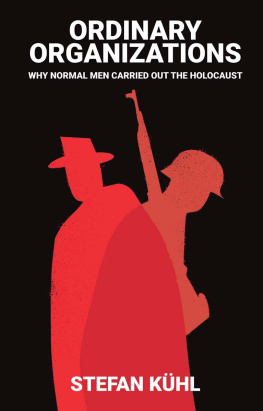Kühl - The nazi connection: eugenics, american racism, and german National Socialism
Here you can read online Kühl - The nazi connection: eugenics, american racism, and german National Socialism full text of the book (entire story) in english for free. Download pdf and epub, get meaning, cover and reviews about this ebook. City: New York, year: 2002;1994, publisher: Oxford University Press, Incorporated, genre: Politics. Description of the work, (preface) as well as reviews are available. Best literature library LitArk.com created for fans of good reading and offers a wide selection of genres:
Romance novel
Science fiction
Adventure
Detective
Science
History
Home and family
Prose
Art
Politics
Computer
Non-fiction
Religion
Business
Children
Humor
Choose a favorite category and find really read worthwhile books. Enjoy immersion in the world of imagination, feel the emotions of the characters or learn something new for yourself, make an fascinating discovery.

The nazi connection: eugenics, american racism, and german National Socialism: summary, description and annotation
We offer to read an annotation, description, summary or preface (depends on what the author of the book "The nazi connection: eugenics, american racism, and german National Socialism" wrote himself). If you haven't found the necessary information about the book — write in the comments, we will try to find it.
Kühl: author's other books
Who wrote The nazi connection: eugenics, american racism, and german National Socialism? Find out the surname, the name of the author of the book and a list of all author's works by series.
The nazi connection: eugenics, american racism, and german National Socialism — read online for free the complete book (whole text) full work
Below is the text of the book, divided by pages. System saving the place of the last page read, allows you to conveniently read the book "The nazi connection: eugenics, american racism, and german National Socialism" online for free, without having to search again every time where you left off. Put a bookmark, and you can go to the page where you finished reading at any time.
Font size:
Interval:
Bookmark:
THE NAZI CONNECTION
Eugenics, American Racism, and German National Socialism
STEFAN KHL

Oxford University Press
Oxford New York
Athens Auckland Bangkok Bogot Buenos Aires Cape Town
Chennai Dar es Salaam Delhi Florence Hong Kong Istanbul Karachi
Kolkata Kuala Lumpur Madrid Melbourne Mexico City Mumbai Nairobi
Paris So Paulo Shanghai Singapore Taipei Tokyo Toronto Warsaw
and associated companies in
Berlin Ibadan
Copyright 1994 by Oxford University Press, Inc.
First published in 1994 by Oxford University Press, Inc.
198 Madison Avenue, New York, New York 10016
First issued as an Oxford University Press paperback, 2002
Oxford is a registered trademark of Oxford University Press
All rights reserved. No part of this publication may be reproduced,
stored in a retrieval system, or transmitted, in any form or by any means,
electronic, mechanical, photocopying, recording, or otherwise,
without the prior permission of Oxford University Press.
Library of Congress Cataloguing-in-Publication Data
Khl, Stefan.
The Nazi connection: eugenics, American racism, and German national socialism / Stefan Khl.
p. cm. Includes bibliographical references and index.
ISBN 019-508260-5; ISBN 019-514978-5 (pbk.)
1. EugenicsUnited States-History20th century. 2. EugenicsGovernment policyGermany
History-20th century. 3. RacismGermanyHistory20th century. 4. National socialism. I. Title.
HQ755.5.U5K84 1994
363.9209730904dc20 93-17283
9 8 7 6 5 4 3 2 1
Printed in the United States of America
on acid-free paper
For Rebecca Jo
While researching the connection of German National Socialists to American eugenicists, I was able to view Erbkrank [Hereditary Defective], a Nazi race propaganda movie that was also used by the American eugenics movement for informing high school students about the need to sterilize mentally handicapped people. The movie showed mentally handicapped people living in a luxurious asylum near Berlin and contrasted their atypicality to the saneness of hereditarily healthy children who had to live in the slums of Germanys large cities. By stressing the abnormality of the handicapped people, this movie helped to pave the way for Nazi policies of mass sterilization and elimination of the mentally handicapped.
The years I spent working with such atypical and abnormal people at Protestant Youth in Munich was the impetus behind my decision to begin working on the history of mentally handicapped people under the Nazis. Without having met Karla Weber, Peter Schnauer, Elmar Wnke, Wolfgang Frisch, Franki Husler, and many others, this book would not have been written. By revealing one of the darkest moments in the history of handicapped people, I hope to thank them for the many things they taught me.
Two of my history teachers deserve special acknowledgment. Horst Dieter Geetz at the Gymnasium of Quickborn introduced me to the multicausality of history, and helped me see the critical relevance of history to my work in the social sciences. My adviser at the University of Bielefeld, Gisela Bock, encouraged my interest in the development of scientific racism. Over the past four years she supported me in nearly every aspect of my work. She generously made time for lengthy discussions, shared many of her own sources, commented extensively on several of my papers, and helped me to gain financial assistance for the timely completion of this endeavor.
At an early stage of my work, Peter Weingart and Hans Walther Schmuhl from the University of Bielefeld helped me to clarify the outline of my project; they later commented on an early draft of this book. Michael Schwartz from the University of Mnster was especially helpful in shaping my thinking about the concept of racism I used in this book. Paul Weindling from the University of Oxford and Peter Lindley at the University of Kent at Canterbury provided me with information and valuable comments. My research was made possible by two different organizations: The German Academic Exchange Service supported a one-year stay in the United States, and the West-flisch-Lippische Universittsgesellschaft agreed on short notice to provide the necessary resources for my archival work.
Many archivists and librarians in the United States, Germany, Great Britain, and France helped me uncover the explosive sources that show the extent and character of the relationship between Nazi and American scientists. I want to thank Martha Harrison of the American Philosophical Society in Philadelphia, Odessa Ofstad of the Pickler Memorial Library in Kirksville, Missouri, and Dr. Alan Burdock of the Milton S. Eisenhower Library at the Johns Hopkins University in Baltimore.
Several teachers and colleagues from my year at Johns Hopkins deserve my thanks. My adviser, Vernon Lidtke, patiently helped me organize my research and commented on several drafts of this book. Sharon Kingsland was exceptionally generous in sharing her impressive knowledge about eugenics and genetics in the United States; she encouraged me to rethink some aspects of my approach. I also want to thank Daniel Walkowitz and Leslie Reagan, both visiting professors at Johns Hopkins in 19911992, for commenting on a shorter version of this book.
Many American historians, notably Daniel Kevles, Garland Allen, Sheila Weiss, Robert Proctor, and Barry Mehler, introduced me to the latest research on American eugenics. Sheila Weiss and Robert Proctor commented on an early draft of this work. Barry Mehler provided insightful comments and spent several days discussing aspects of my research. He also generously shared many sources. Carl Degler and Robert Pois provided useful comments and convinced me to rewrite some details of an early draft.
Writing a study in a foreign language is always difficult, particularly under the burden of pressing deadlines and time constraints. At Oxford University Press, Nancy Lane, senior editor, and Edward Harcourt, editorial assistant, were enthusiastic about this project from the very beginning. Because they made themselves so available for me, this book was readied for the press in perhaps record time.
I also deeply appreciate the help of my friends and fellow graduate students in Baltimore. Colin Essamuah, Wolfgang Splitter, and Jrgen Wagner all gave editorial advice on various sections of an early draft. Tanya Kervokian looked over my German translations. Alisa Plant was always a great help in clarifying uncertainties about the use of language. During the final week of editing, Lynn Gorchov read and commented on the final version. My two dear roommates in Baltimore, Lori Bernstein and David Bernell, urged me to turn my research into a book and were unfailing sources of encouragement while I was writing the bulk of the manuscript.
More than anyone else, however, Rebecca Jo Plant participated in the genesis of this book. She painstakingly edited several drafts of the manuscript, helped me to clarify some of my ideas, and improved the style of the final draft. In the process, she convinced me that working on a fascinating subject can be, for a certain time, nearly the most important thing in life.
Paris
May 1993
S. K.
My interest in the relations between German racial hygienists and American eugenicists emerged from my work in the archive of the largest Protestant institution for mentally handicapped and epileptic people in Germany, the von Bodelschwinghschen Anstalten in Bethel. My aim was to examine whether this famous German institution was the stronghold of resistance against the Nazi race program that it later publicly presented itself to have been. Fritz von Bodelschwingh, director during the entire period of Nazi rule, has become known as one of the main figures who resisted the extermination of mentally handicapped people during World War II. Sources located at Bethel and other institutions, however, led me to doubt the veracity of this interpretation.
Next pageFont size:
Interval:
Bookmark:
Similar books «The nazi connection: eugenics, american racism, and german National Socialism»
Look at similar books to The nazi connection: eugenics, american racism, and german National Socialism. We have selected literature similar in name and meaning in the hope of providing readers with more options to find new, interesting, not yet read works.
Discussion, reviews of the book The nazi connection: eugenics, american racism, and german National Socialism and just readers' own opinions. Leave your comments, write what you think about the work, its meaning or the main characters. Specify what exactly you liked and what you didn't like, and why you think so.








